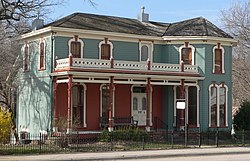2010 census
As of the census [12] of 2010, there were 132 people, 73 households, and 40 families residing in the village. The population density was 203.1 inhabitants per square mile (78.4/km2). There were 103 housing units at an average density of 158.5 per square mile (61.2/km2). The racial makeup of the village was 97.7% White, 0.8% Native American, 0.8% from other races, and 0.8% from two or more races. Hispanic or Latino of any race were 3.0% of the population.
There were 73 households, of which 9.6% had children under the age of 18 living with them, 46.6% were married couples living together, 1.4% had a female householder with no husband present, 6.8% had a male householder with no wife present, and 45.2% were non-families. 42.5% of all households were made up of individuals, and 20.5% had someone living alone who was 65 years of age or older. The average household size was 1.81 and the average family size was 2.30.
The median age in the village was 60.8 years. 6.8% of residents were under the age of 18; 6.9% were between the ages of 18 and 24; 7.6% were from 25 to 44; 40.1% were from 45 to 64; and 38.6% were 65 years of age or older. The gender makeup of the village was 53.0% male and 47.0% female.
2000 census
As of the census [3] of 2000, there were 146 people, 74 households, and 40 families residing in the village. The population density was 233.9 inhabitants per square mile (90.3/km2). There were 106 housing units at an average density of 169.8 per square mile (65.6/km2). The racial makeup of the village was 99.32% White, and 0.68% from two or more races.
There were 74 households, out of which 20.3% had children under the age of 18 living with them, 44.6% were married couples living together, 5.4% had a female householder with no husband present, and 44.6% were non-families. 40.5% of all households were made up of individuals, and 17.6% had someone living alone who was 65 years of age or older. The average household size was 1.97 and the average family size was 2.63.
In the village, the population was spread out, with 18.5% under the age of 18, 5.5% from 18 to 24, 19.2% from 25 to 44, 34.2% from 45 to 64, and 22.6% who were 65 years of age or older. The median age was 51 years. For every 100 females, there were 117.9 males. For every 100 females age 18 and over, there were 108.8 males.
The median income for a household in the village was $34,375, and the median income for a family was $51,000. Males had a median income of $35,750 versus $28,438 for females. The per capita income for the village was $20,928. There were 11.5% of families and 15.9% of the population living below the poverty line, including 15.2% of under eighteens and 17.9% of those over 64.



